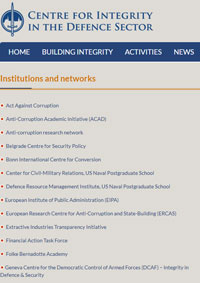
Centre for Integrity in the Defence Sector is a great resource for Building Integrity in Defence topics. Based in Norway, this organisation specialises in a variety of knowledge products from courses to publications, which can be found on their website. The CIDS website resource section can be of special value to those seeking a quick overview of key knowledge sources on this subject.
For more information please
visit the site
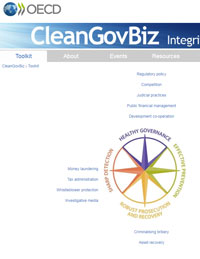
The Toolkit offers practical guidance on how corruption can best be tackled in multiple domains. This toolkit draws together relevant instruments to support the establishment of healthy systems of governance, prevent corrupt practices, detect corruption, prosecute delinquencies and remedy the consequences of corruption.
For each policy area contributing to the fight against corruption, users are provided with:
- Priority checklists
- Implementation guidance with examples of good practices
- Access to existing relevant standards and instruments, guides and manuals, case studies and reviews elaborated by international and civil society organisations
For more information please
visit the site
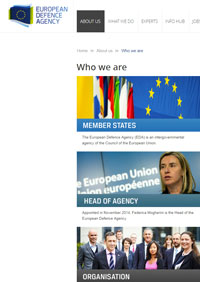
This is a tool that allows open and competitive bidding in defence procurement. The Gateway is held by the European Defence Agency. This tool contributes to the integrity of the decision making process in procurement by making it more transparent.
The tool enables Ministries of Defence in the subscribing Member States to publicise transparently their defence contract opportunities on a single European defence business portal; provides European defence-related companies an equal window of opportunity for accessing defence contract opportunities; encourages transparency and strengthens competition, laying the foundation for the development of the European Defence Equipment Market (EDEM).
For more information please
visit the site
.jpg)
The European Partners against Corruption (EPAC) is an independent, informal network bringing together more than 60 anti-corruption authorities and police oversight bodies from Council of Europe Member Countries. EPAC offers a medium for practitioners to share experiences, identify opportunities, and cooperate across national borders in developing common strategies and high professional standards.
For more information please
visit the site
.jpg)
The Financial Action Task Force (FATF) is an inter-governmental body established in 1989 by the Ministers of its Member jurisdictions. The objectives of the FATF are to set standards and promote effective implementation of legal, regulatory and operational measures for combating money laundering, terrorist financing and other related threats to the integrity of the international financial system. The FATF is therefore a “policy-making body” which works to generate the necessary political will to bring about national legislative and regulatory reforms in these areas.
For more information please
visit the site
.jpg)
The Group of States against Corruption (GRECO) was established in 1999 by the Council of Europe to monitor States’ compliance with the organisation’s anti-corruption standards. GRECO’s objective is to improve the capacity of its members to fight corruption by monitoring their compliance with Council of Europe anti-corruption standards through a dynamic process of mutual evaluation and peer pressure. The group helps to identify deficiencies in national anti-corruption policies, prompting the necessary legislative, institutional and practical reforms. GRECO also provides a platform for sharing best practices in the prevention and detection of corruption.
For more information please
visit the site
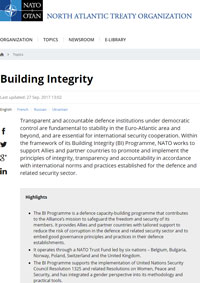
The Building Integrity (BI) Programme provides practical tools to help participating countries strengthen integrity, transparency and accountability and reduce the risk of corruption in the defence and security sectors. The programme promotes good practice, processes and methodologies, and provides countries with tailored support to make defence and security institutions more effective.
For more information please
visit the site
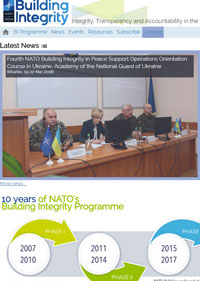
This is the web portal of NATO Building Integrity Programme. This programme provides practical tools to help participating countries strengthen integrity, transparency and accountability and reduce the risk of corruption in the defence and security sector. The programme promotes good practice, processes and methodologies, and provides countries with tailored support to make defence and security institutions more effective.
The BI Programme is tailored to meet national needs and requirements. It is demand-driven and participation is on a voluntary basis. The programme is open to all NATO Allies and partners (members of the Euro-Atlantic Partnership Council, the Mediterranean Dialogue, Istanbul Cooperation Initiative and partners across the globe). Requests from other countries are reviewed by NATO on a case-by-case basis.
For more information please
visit the site
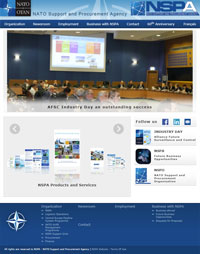
The NATO Support and Procurement Agency (NSPA) is a customer-funded agency, operating on a “no profit – no loss” basis. The NSPA is the executive body of the NATO Support and Procurement Organisation (NSPO), of which all 28 NATO nations are members. The NSPA brings together in a single organisation NATO’s logistics and procurement support activities, providing integrated multinational support solutions for its stakeholders. NSPA provides support to NATO by leveraging capabilities for new customers and geographic areas, and developing new capabilities in the areas of:
- Support to Operations and Exercises,
- Systems Procurement and Life-Cycle Management,
- Fuel Management,
- Strategic Transport and Storage,
- Logistics Services and Project Management.
For more information please
visit the site
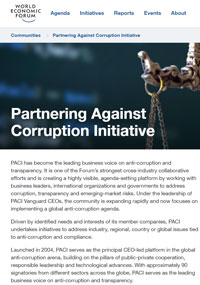
Partnering Against Corruption Initiative (PACI) is one of the Forum’s strongest cross-industry collaborative efforts and is creating a highly visible, agenda-setting platform by working with business leaders, international organizations and governments to address corruption, transparency and emerging-market risks. Driven by identified needs and interests of PACI Member companies, PACI undertakes initiatives to address industry, regional, country or global issues in anti-corruption and compliance.
For more information please
visit the site
Page 1 of 3



